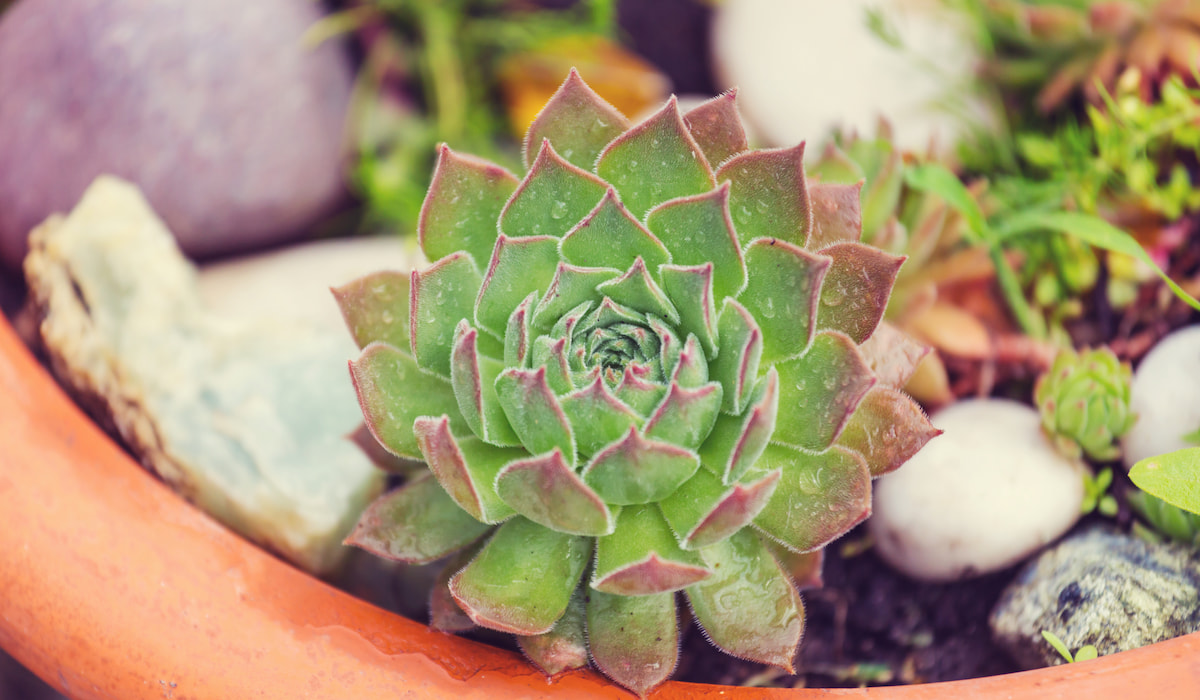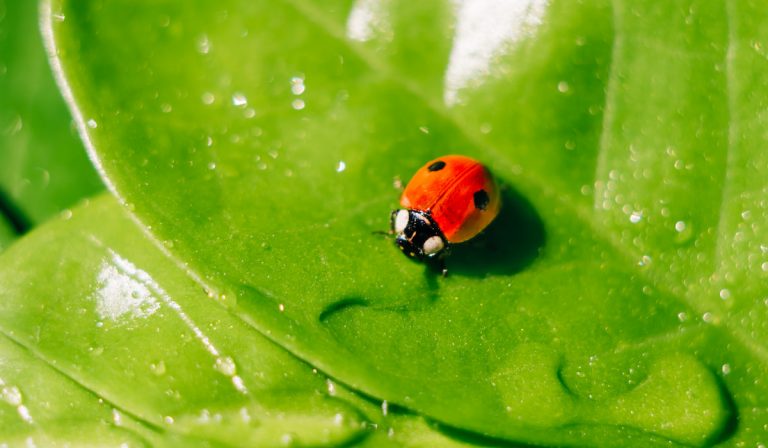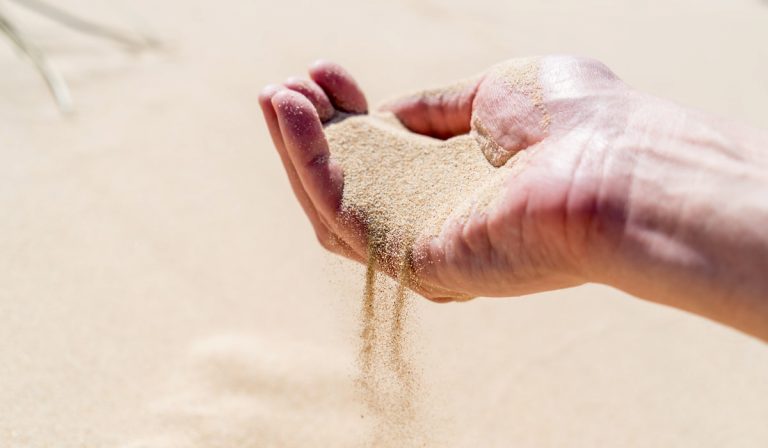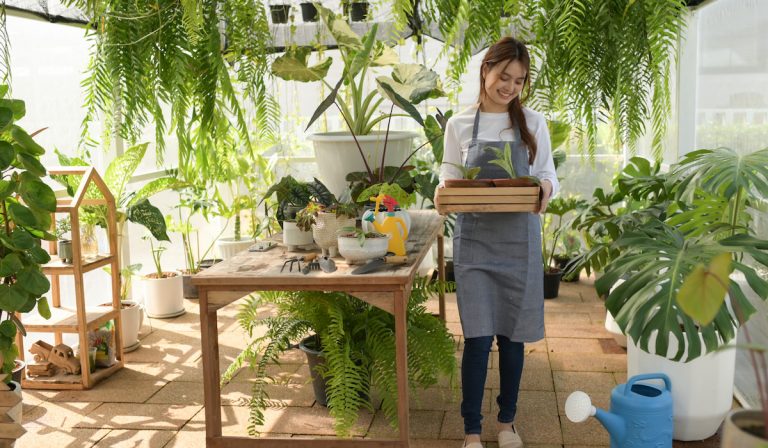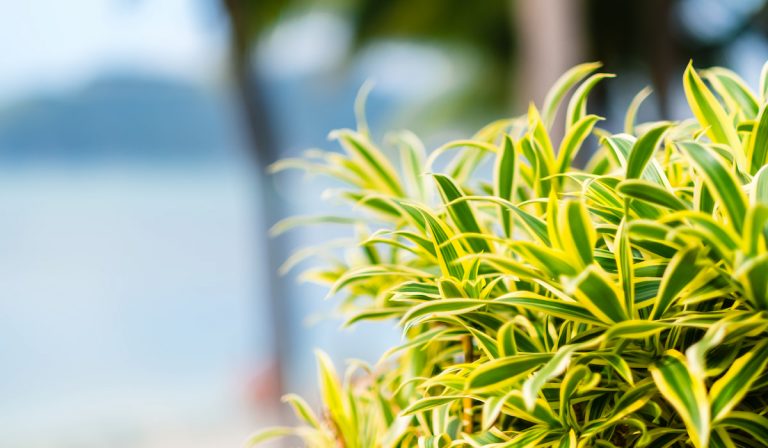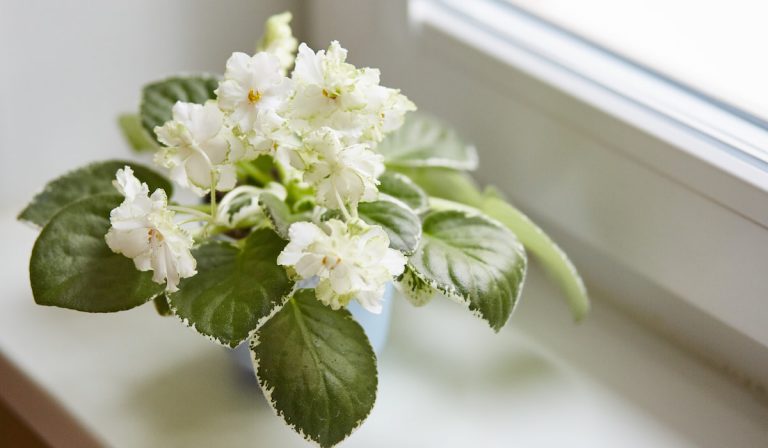Do Succulents Attract Bugs?
Succulents will always be a great way to elevate the look in your home or yard. Thus, it is no surprise that they are so popular.
But their beauty is not the only reason they are popular. Succulents are also popular for being pest resistant and easy to care for.
Do succulents attract bugs?
Succulents resist bugs to an extent.
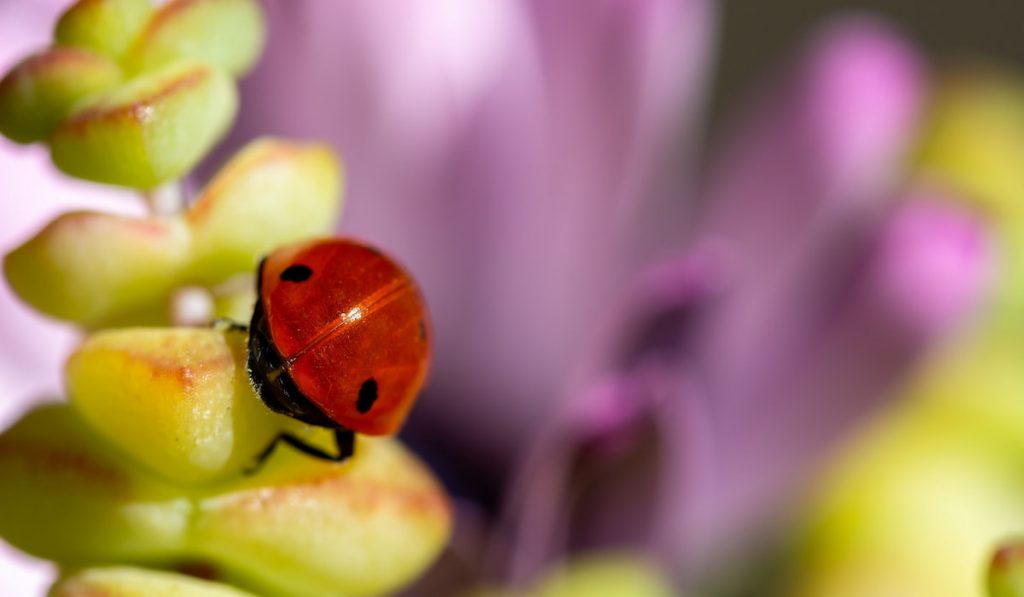
But this does not mean they do not attract bugs sometimes. The immense water capacity of succulents is appealing to bugs. So their attraction to succulents is not surprising. Besides, bugs might also be attracted by constantly wet soil.
In this article, we identify some insects or animals that may disturb your succulents. Then, we even things out by offering some tips on how to keep bugs off your succulents.
Table of Contents
Do Succulents Attract Bugs?
Yes, succulents attract bugs. Despite being largely bug-resistant, succulents are not totally safe from pests. Their water content and perhaps the water content of their soil play vital roles in attracting bugs to them.
When attracted to them, bugs can make succulents go from attractive to unsightly. In extreme cases, they could kill the plants.
Regular household insects typically pose no threat to succulents. However, some bugs not common to households might cause issues.
Types of Bugs Succulents Attract
Listed below are some common insects which succulents attract:
Mealybugs
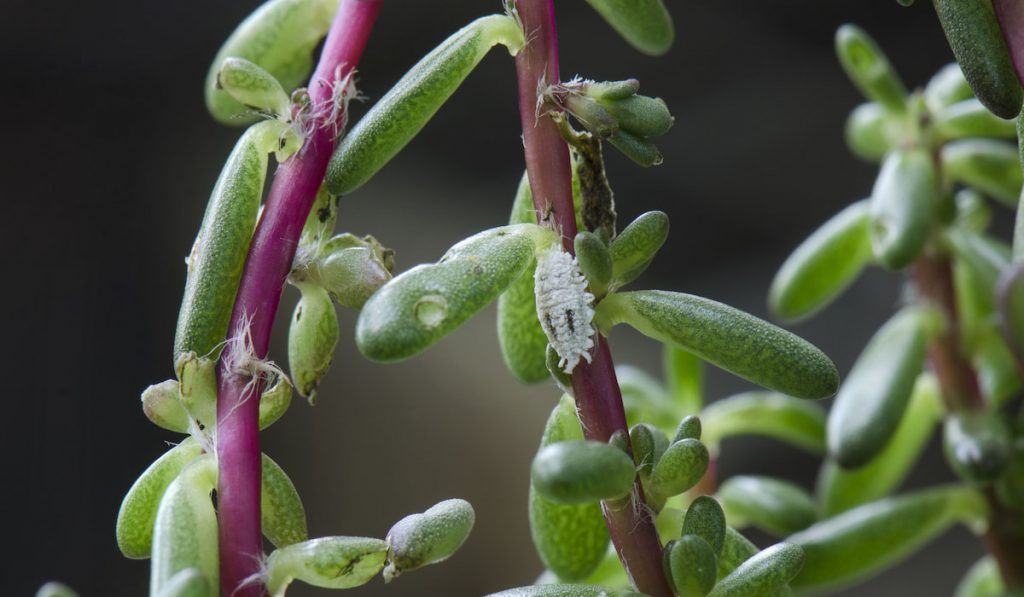
Mealybugs are soft-bodied gray or light-brown insects typically covered in white, cotton-like filaments. So, if you notice white tiny cottony fuzz on the stem or leaves of your succulents, it is a sign of mealybugs.
Mealybugs produce a sugary substance that attracts molds. When this happens, the plants become susceptible to secondary bacterial and fungal infections. Eventually, these infections will kill your plant.
A female mealybug lays around 600 eggs. Once these eggs hatch, they stay on your succulent and drain all the water in them. So at first, you may see only a few of them. But later, they will become many.
Scale
Another common insect that can harm your succulent is scale. This insect is of two types: the soft scale and the armored scale. Both scale types can cause damages to your succulents.
If you notice small, brown lumps on your succulent, it indicates the presence of scales. Scale insects tend to drain the sap out of succulent plants. This takes away the turgor of your plant, leaving it less attractive and prone to diseases.
Aphids
Aphids suck the stems and leaves of succulent plants. They also produce a sugary substance that makes your infested succulent vulnerable to mold.
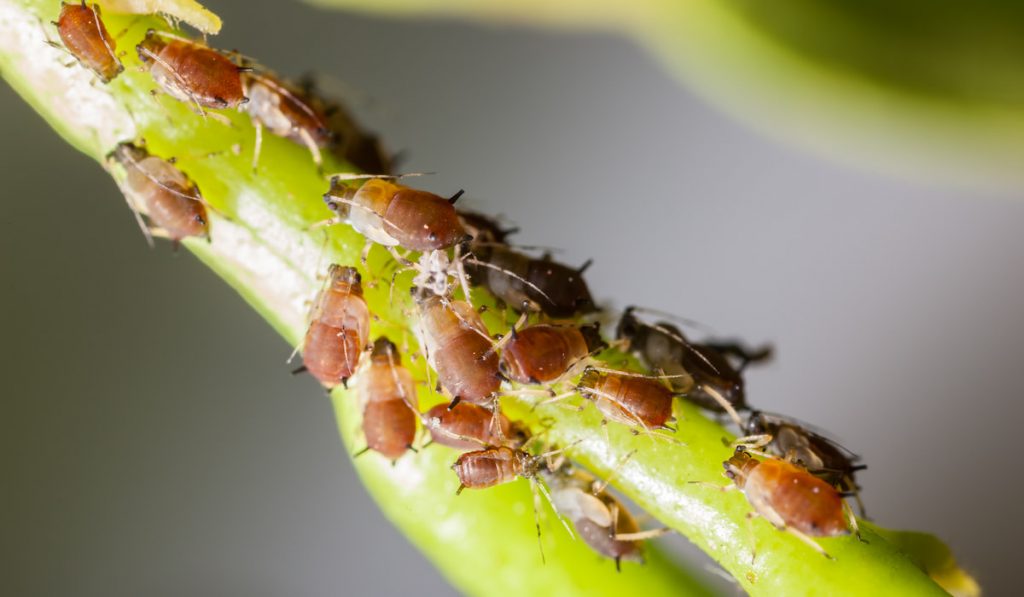
Spider Mites
Another insect that poses a threat to your succulent is a spider mite. Spider mites are quite small, making them almost impossible to notice. Succulents damaged by spider mites end up being silvery and white as the bugs drain their sap.
The first sign of a spider mite infestation is tiny white webs on the succulent. Once you notice this, get rid of it.
Besides the webs, spider mites leave behind small, rust-colored dots on the areas where they feed. Once your succulent is damaged to this extent, it leaves the door open for other infections.
If you see any of these signs, isolate the infected plants immediately. Isolating the plant during treatment is the best course of action to prevent the spider mites from spreading to other plants.
Whiteflies
If you own leafy succulents, you might have already encountered whiteflies. The problem with whiteflies is that they secrete honeydew, leaving the infested succulent vulnerable to mold.
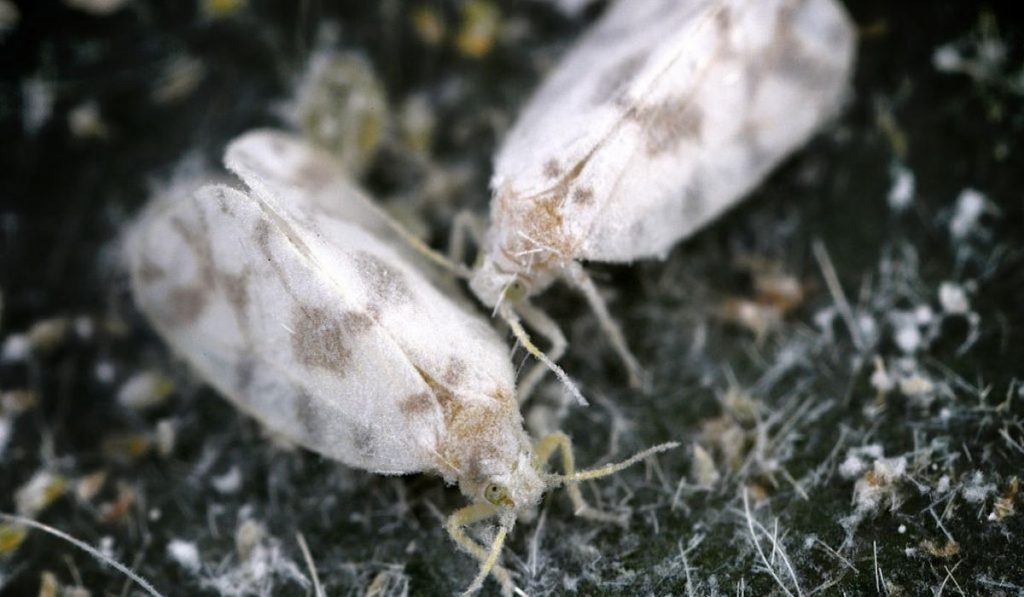
Gnats
Although gnats are not as harmful as the other bugs, they can be a nuisance to your succulent. Gnats are tiny, flying, black insects. They fly around your succulents or terrarium and can be really annoying.
To avoid gnats hovering over your succulents, you have to stop overwatering them. Succulents can survive droughts, so they do not need too much water. Plus, overwatering them can cause root rot.
The root rot results in a fungus infection that will attract gnats. The gnats, in turn, will bury themselves in the leaves of the succulent and end up causing severe damage.
Ants
Normally, ants are not harmful to your succulent. But when your succulents become infested by the insects mentioned earlier, the sugary substance they secret attracts the ants.
The infestation of your succulent by a large group of ants is what eventually damages them.
How Do I Keep Bugs off My Succulents?
Here are some tips for keeping bugs off your succulents:
Use Rubbing Alcohol
Rubbing alcohol can kill most of the bugs mentioned above. You can try keeping the bugs off with it.
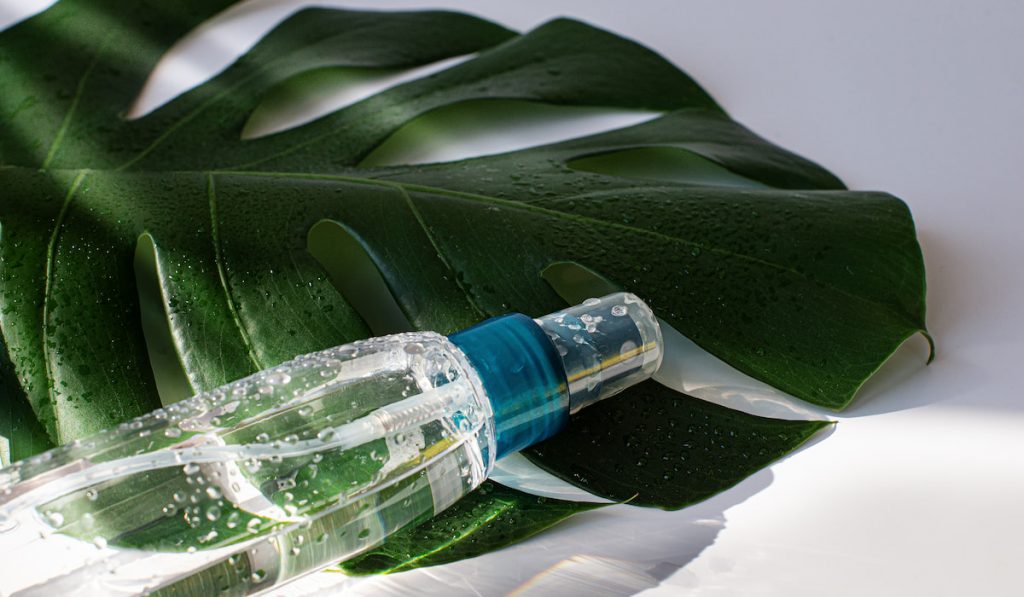
When using rubbing alcohol, you should not spray the leaves or plants with it as this might damage the succulent. Instead, touch the bugs with a cotton swab soaked in rubbing alcohol. This will kill the bugs immediately.
The method described here is only suitable for minimal infestation. When the infestation is out of control, rubbing alcohol would be ineffective and not practical.
Pesticides and Insecticides
This method may not be the best solution for ridding your succulents of bugs. This is because the toxic chemicals in many insecticides and pesticides can harm your succulent.
However, if you get a non-toxic pesticide, the outcome should be better.
Removing Parts of Your Succulent
Depending on the type of bugs infesting your plant, you may need to remove some parts of your succulent. This is the best option, especially when the pests prove difficult or the succulent has suffered too much damage.
For example, when your succulent is infested with scales, you may have to remove the affected part(s). Especially when their numbers keep multiplying.
Use Beneficial Insects
You may also get rid of these bugs by bringing in other beneficial insects. Ladybugs or other types of mites, for instance, will not damage your succulents. These bugs will eat the harmful bugs harming your succulent. This option is not suitable for indoor succulents but is excellent for your outdoor succulents.
Which Bugs Are Eating My Succulents?
Several bugs have made succulents part of their diets. Feeding on succulents by these bugs can eventually damage your plant. Some of these succulent-eating bugs include:

Mealybugs
These nasty bugs enjoy eating the new growth on succulents. If not immediately treated, they can spread and move to other succulents.
When mealybugs eat your succulent, they stunt its growth. They may also cause the new plant growth to look smaller and oddly shaped, and they may leave dents if they are not removed immediately.
Aphids
Aphids feed on the leaves of succulents. But unlike mealybugs, they are easy to eliminate because they are not as fast. It does not take much to squash and wash them off your succulent.
Grasshoppers
During their feeding season, grasshoppers feed on succulent leaves. Unfortunately, they can be hard to eliminate.
What Animal is Eating My Succulents at Night?
Animals that eat succulents at night include:
Possums
Possums can consume several succulents overnight. They enjoy eating the centers of Graptopetalums, Echeverias, and several other succulents. If you spot a possum and your succulents are missing parts of their leaves, they are likely responsible.
Slugs and Snails
Snails and slugs also love eating succulents. These creatures hide in crevices during the day, and by nightfall, they come out to feed on your plants.
Squirrel
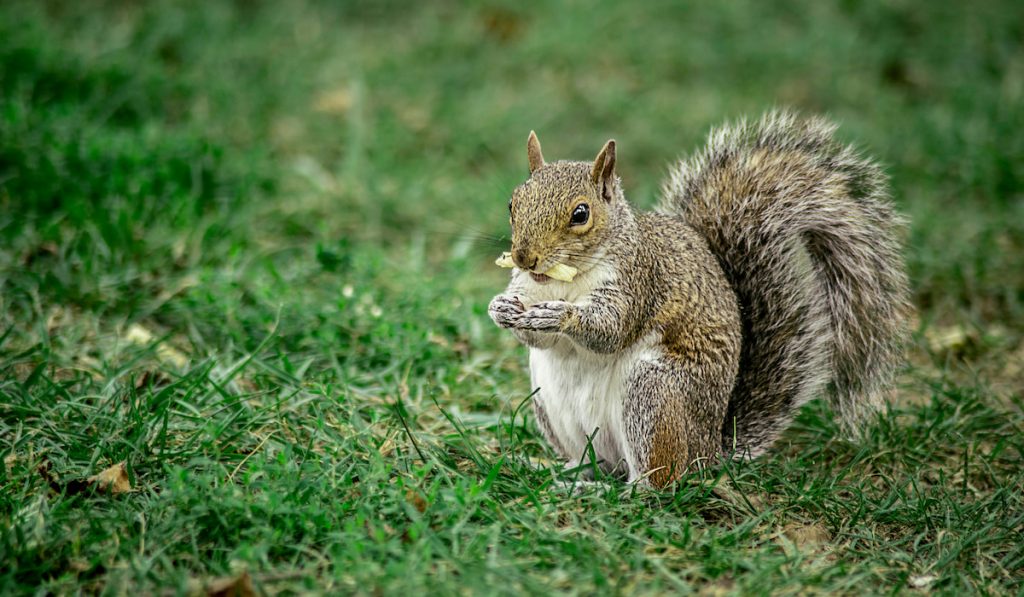
It is easy to notice when you have a squirrel problem. Squirrels tend to dig and chew their way through gardens. If you notice any uprooted plants or chewed-up leaves, it means you have a squirrel problem.
The damage done to your succulents by squirrels is not hard to recognize. Unlike other pests, squirrels eat big pieces of your succulent and leave behind deep wounds and jagged tear marks on the leaves.
Final Thoughts
In general, succulents are bug-resistant. But their high water content may still attract some bugs to them. Also, if the soil holding a succulent remains wet for too long, bugs are attracted. While some of these bugs are harmless, most of them will damage the plant.
Resources
- https://succulentsgrower.com/do-succulents-attract-bugs/
- https://succulentalley.com/do-succulents-attract-bugs/
- https://www.succulentsandsunshine.com/kill-mealybugs-on-succulents/
- https://succulentgrowingtips.com/what-eats-succulent-leaves/
- https://edensucculents.com/animals-that-love-to-eat-succulents/
- http://blogs.ifas.ufl.edu/monroeco/2009/09/16/mealybugs-come-in-all-shapes-and-colors/

